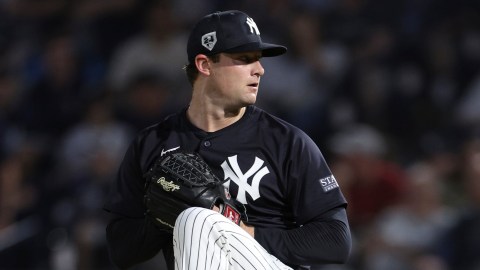 We have officially reached that point. The point that New York Yankees fans and front office alike have feared. The point that caused general manager Brian Cashman to play hardball in contract talks after the 2010 season. The point where a god has been reduced to a mere mortal.
We have officially reached that point. The point that New York Yankees fans and front office alike have feared. The point that caused general manager Brian Cashman to play hardball in contract talks after the 2010 season. The point where a god has been reduced to a mere mortal.
Derek Jeter is hurting the Yankees with his own hubris.
On Thursday night, The Captain made his long-awaited return to the Yankees starting lineup after breaking his left ankle during the 2012 ALCS. Eight innings later, Jeter was removed from the game for pinch hitter and will undergo an MRI after suffering tightness in his right quadriceps.
Given all that the Yankees have suffered through injury-wise this season, it’s a huge blow. At age 39, every season is going to be a legitimate question as to how much Jeter can contribute with his bat and glove, but it’s been oft-stated that his mere presence means so much to New York. Either way, it’s a safe bet that Jeter would have been a better option at shortstop than Eduardo Nunez‘s .283 slugging percentage.
However, if you don’t think that the Yankees and Jeter rushed his return to their own detriment, you’re a fool.
Jeter’s newest injury may or may not be serious; he’s already told manager Joe Girardi that he wants to be in Friday’s lineup. But here are the facts: Jeter is 39 years old. He returned from his broken ankle after nine months, despite the usual prognosis for similar injuries being 12 months. Jeter played parts of four games on his minor league rehab assignment, a grand total of 22 innings and 13 plate appearances.
Moreover, the quad injury being on his right leg suggests that Jeter is still compensating for weakness in that left ankle.
In short, Jeter is a human being, and now, less than a year away from 40, he’s a human being who’s that much more susceptible to injury. However, Jeter and the Yankees continue to treat his body as if he’s the same 20-something who could bloody himself chasing foul balls down into crowd and be no worse for the wear. They continue to treat him as if cortisone shots — like the one connected to that ankle break — won’t have long-term effects.
The plain fact of the matter is that, with his style of play, it’s nothing more than a fluke that Jeter had never before suffered a similarly catastrophic injury. Now, with a body that can no longer stand up to the rigors of relying on pure luck to maintain it, Jeter is breaking down, and he can blame only himself and the Yankees.
Before New York’s 8-4 win over the Royals, Cashman admitted as much.
“He hadn’t completed the whole profile we had set up for him in his rehab, but the roster changes that occurred in the game last night made us do some adjustments along the way,” Cashman told reporters. “He’ll have to finish off his rehab in the big leagues.”
But rehab is not MLB. The speed of the game is completely different, and players, intentionally or otherwise, just don’t push themselves in the same way they will when something is actually on the line. When Jeter beat out an infield single on the first pitch he saw Thursday, that was a kind of physical exertion he hadn’t experienced in nine months. How did he prepare for that? With all of 13 plate appearances.
Which brings us to Alex Rodriguez.
For all the ire that Rodriguez has drawn in relation to, well, so many things, he’s handling his rehab so much better than Jeter did. There are those who will point out that the Yankees may be taking their time with Rodriguez because they don’t really want him in the Bronx, but the reality is that Rodriguez has as much to offer on the field as Jeter does at this point in their careers. Despite his power outage, Rodriguez posted a .353 OBP and played above-average defense in 2012, and that’s something the Yankees could desperately use at third base right now.
But for whatever reason, the Yankees are allowing Rodriguez to go through all the necessary steps and check off all the necessary boxes as he returns from hip surgery. Likewise, Rodriguez has consistently espoused a patient approach, understanding that, at his age, it’s just not prudent to rush things, physically.
Now, the obvious counter from so many who have bought into the Jeter hero complex over the years is that Jeter’s rush to get back on the field is a byproduct of his pure desire, and that embodies his competitive spirit and the true Yankee Way.
In no uncertain terms, this type of logic is brashness to the point of stupidity.
Jeter only helps the Yankees if he’s on the field. To be on the field, he needs to be healthy. As has clearly been demonstrated, a 39-year-old body won’t respond to a scaled-back rehab schedule in a positive way. So, even if Jeter’s rush back is fueled by a desire to hurt the team, it only says that he’s too prideful to step back and look at things from an objective perspective.
With injuries, it’s almost impossible to predict the future. However, don’t be surprised if Rodriguez is able to return, stay on the field and contribute more to the Yankees than Jeter does in 2013. There are no shortcuts to health as a professional athlete nearing 40, and this is a lesson Rodriguez at least outwardly understands better than Jeter.
Can the modern Pride of the Yankees curb that pride to help his team? That remains to be seen.



